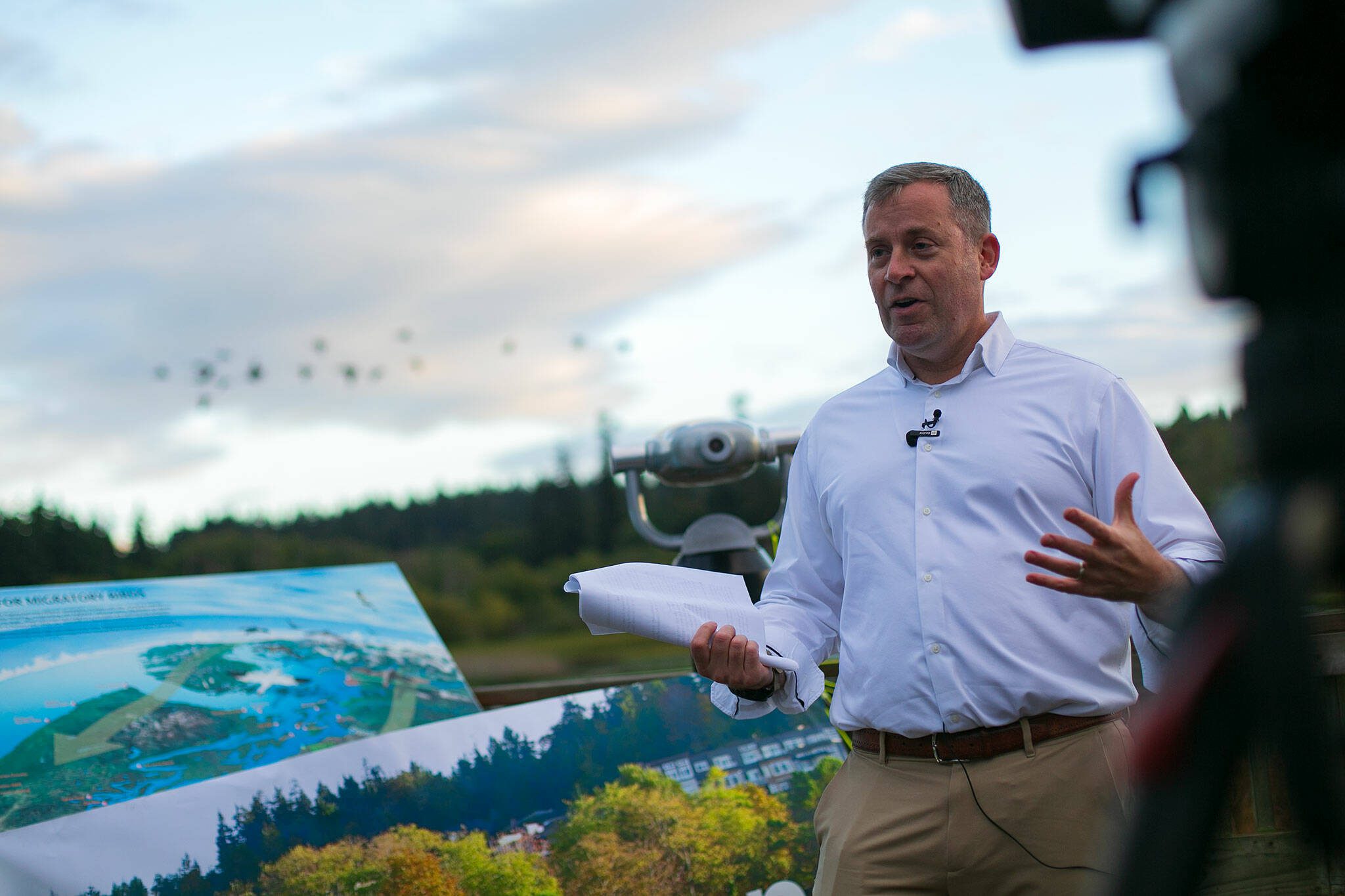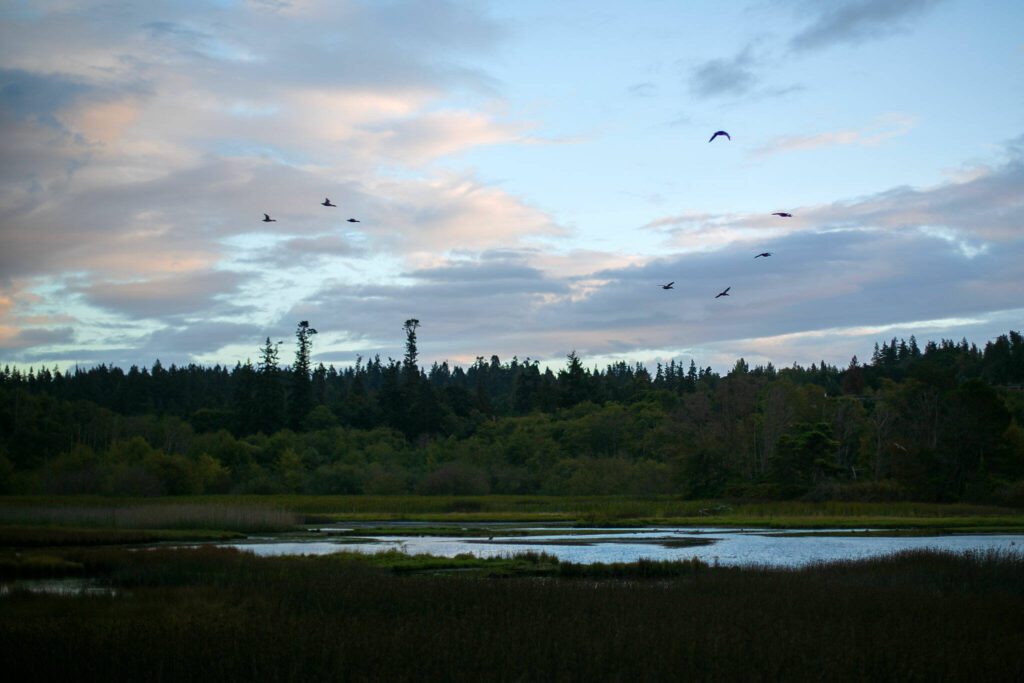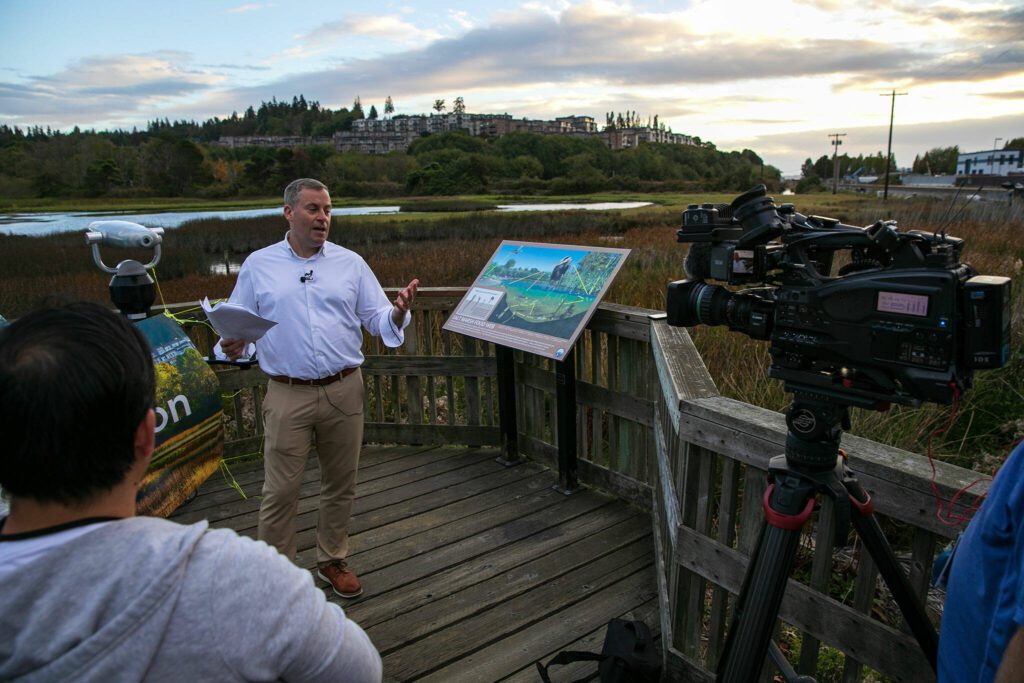EDMONDS — Over a century ago, the Edmonds Marsh enveloped about 100 acres and featured tidal openings that welcomed salmon.
Now, the brackish marsh is 22½ acres with no trace of the Chinook and coho salmon that once swam through its shallows.
That’s why marsh advocates are quick to consider any opportunity to preserve the tidal estuary. Currently, city officials and environmentalists are interested in about 21 acres of possible marsh expansion. The land, owned by Chevron but still referred to as the “Unocal property,” will likely become available for purchase next year. But city leaders disagree on who — the city or the state — should buy the property, muddying an already complex issue.
“It won’t be a marsh and it won’t be restored unless we are in the driver’s seat,” Edmonds Mayor Mike Nelson said at a small press conference, convened without notifying City Council, last month on the marsh’s boardwalk.
The mayor has a long history of promoting marsh restoration, tracing back to when he was a City Council member and encouraged a study to evaluate the wetland’s health. It’s a focus he shares with mayoral challenger Mike Rosen, who also plans to “advance efforts to expand the marsh into the existing Unocal property,” if he were to get elected.
It has become a central issue with Election Day less than a month away.
Rosen said he’s less concerned about who buys the property.
“I am focused on how we get it restored,” he said. “Is there another path that can get us there faster, better, cheaper?”
In June, Nelson and the state Department of Transportation entered into a memorandum of understanding, confirming the state agency intends to offer the land first to the city of Edmonds for purchase. But first the state Department of Ecology has to conclude cleanup efforts at the site — a former bulk fuel terminal and then asphalt plant — have been successful. That’s expected to happen in early 2024.
Nelson and the City Council also sent a letter in August to Secretary of Transportation Roger Millar, informing him the city was exploring “the potential for the State to retain ownership of the property” as well.
Millar’s response was straightforward: “While fully supporting Edmonds Marsh being utilized for estuary restoration, I understand both the Departments of Ecology and Fish and Wildlife have previously stated they see no purpose in their respective agencies owning the property.”
On Oct. 4, the Edmonds City Council then wrote to Gov. Jay Inslee, still hoping to discuss whether a state agency managing natural areas, wildlife protection and outdoor recreation could buy the property.
Nelson feels the council’s letter undermines the agreement between Edmonds and the state Department of Transportation. And four years ago when Nelson became mayor, he said he met with the governor, and no state agencies were interested in purchasing the marsh at that point either.
“We’ve asked everybody,” Nelson said, “and now we’re asking everyone again.”
Five City Council members supported sending the letter to the governor, with Jenna Nand abstaining. Council member Susan Paine, the lone opposition, said she respects the decision the council made but said members need to be thoughtful about marsh efforts.
“Everyone is on pins and needles,” Paine said. “None of us want to make a misstep.”
One of the council members who voted in favor of the letter, Dave Teitzel, said it wasn’t intended to jeopardize the memorandum of understanding. He said council members wanted to verify, completely, whether the state would financially support the property’s restoration.
The state Department of Ecology’s current cleanup standards for the property are to make it safe for commercial and residential use — not necessarily for salmon and other aquatic life. If the city bought the property, Teitzel said more cleanup efforts could be necessary.
“The city doesn’t have the resources to do that,” he said, “but the state does.”
Teitzel said, as of this week, the governor hadn’t responded to the letter.
Despite the ongoing debate about who should purchase the Unocal property, everyone invested in the marsh preservation agrees they don’t want the land to go to a developer. Property with views of Puget Sound and the Olympics would be a prime location for condos. Local officials worry the price tag could be too high for the city budget.
Council member Teitzel pinned the cost at over $20 million at a council meeting last month while Paine said there wasn’t a firm basis for that number.
Edmonds resident Joe Scordino, a retired NOAA biologist, has been leading marsh efforts for years. For almost a decade, Scordino has been a project leader for the Edmonds Stream Team, collecting water quality data from local waterways to ensure suitability for salmon. He’s motivated by the hope his grandchildren will have greater access to the marsh, as portions of it are gradually restored.
The 21-acre Unocal property just south of the marsh is the “impediment” standing in the way of salmon recovery, Scordino said. If the land became an extension of the marsh, advocates could establish a new channel.
“We won’t get adult salmon back,” Scordino said, “unless we have an open connection to Puget Sound.”
Ta’Leah Van Sistine: 425-339-3460; taleah.vansistine@heraldnet.com; Twitter: @TaLeahRoseV.
Talk to us
> Give us your news tips.
> Send us a letter to the editor.
> More Herald contact information.





























